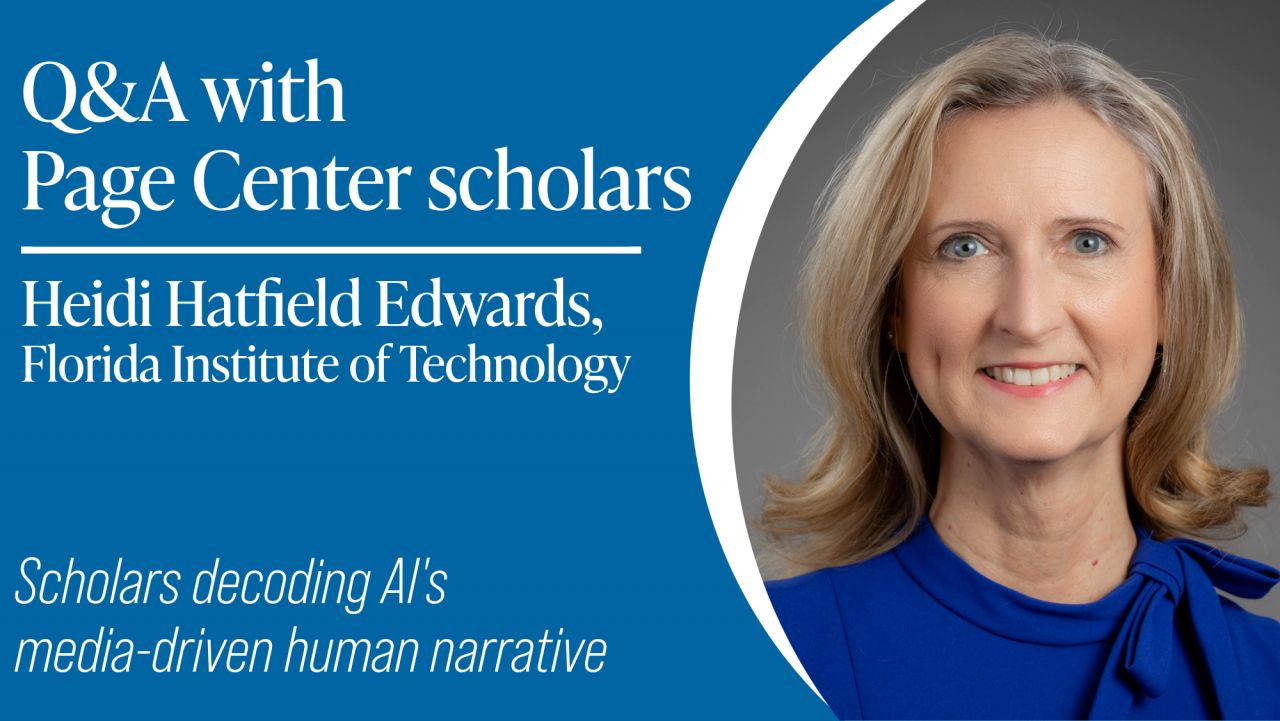June 24, 2025
Understanding the media’s role in hyping AI – Scholar Q&A with Heidi Hatfield Edwards

Through a unique interdisciplinary project, Page Center scholars from the Florida Institute of Technology Heidi Hatfield Edwards, Moti Mizrahi and Theodore Petersen are exploring the hype behind artificial intelligence’s rise. Their study will examine how media and society anthropomorphize AI, exaggerating its human-like qualities. Each researcher brings a distinct perspective: Mizrahi’s expertise is in philosophical ethics; Petersen’s is in journalism; and Hatfield Edwards’ is in public relations and framing research. Together, the team will develop best practices for AI media coverage and build an understanding of how technological narratives shape public perception.
Their project is part of the Page Center’s 2025 research call on the ethics of generative AI. Hatfield Edwards is a senior research fellow at the Page Center and has been a scholar for many years. Mizrahi and Petersen are first time Page Center scholars. In this Q&A, Hatfield Edwards talks about how the collaboration came together and how the results could influence attitudes toward AI.
How did the three of you get together and begin this collaboration?
Florida Tech is a pretty small university. We're all in the same school, the School of Arts and Communication, which is very eclectic. We have humanities. We've got music, history and literature, and philosophy, which is where Moti is. And we also have communication – strategic communication, journalism and languages. We all work together and share a lot of interests. So, when this research call came out, I reached out to both Ted and Moti, thinking that it would be a great opportunity for us to do a project together.
Your project is looking at 'AI hype.' What does that mean?
When we think about hype, we often think about it as mere publicity. For example, “We're going to hype up an event.” We try to generate some excitement for it. Well, the way we’re using hype is taking it a step further – not just promoting AI, but an overinflation of what it can do. It’s exaggerated excitement … and this is common with new technologies. People say, “This is going to be the best thing ever. This is going to take over the world.” We may not know if it’s true, and a lot of times something can get over-hyped. It’s exaggerated beyond what’s possible.
So, we want to look at that hype. Specifically, the idea of anthropomorphizing AI or imbuing it with qualities that are human – actual human qualities. AI doesn't have a soul. It doesn’t feel. AI isn't engaging in critical thinking. But, we see those words and those qualities being applied within the discussions about AI. That's true exaggeration. We are not anywhere near that level of real cognition and real humanness of computers. That is the hype we are studying.
With AI evolving so quickly and the research trying to keep up, specifically ethics research, how do you see this project fitting into the current literature?
Right now, there's a lot of research going on in AI. It's the new thing. I think one of the things from our study’s perspective is that we're trying to look at this as if it's another new tool. It's another new technology. We're looking at things like framing – How are we talking about it? We're looking at narrative – What stories are we telling about it? We’re looking at education – Are we introducing new classes on AI and how are we integrating lessons into existing curriculum?
Can you expand on the educational perspective?
Technology is constantly changing. So, if we are constantly creating new classes, there's a lot of them that are going to be landing in the dust while we still need to focus in on the basics, the foundation. We as educators are truly critical in making sure that students have what they need to be able to take that more advanced position. If the AI is the entry level now, there must be that extra added value that you, as a new graduate, bring to the workplace.
In terms of outcomes, what practical takeaways do you foresee coming out of this project?
We want to make sure outcomes are accessible to the folks who are hyping this technology. We want to provide them with some best practices. We'd also like to do a conference presentation, and we look forward to contributing a chapter to the book [senior research fellows] Fuyuan Shen and Heather Shoenberger are looking at doing. Also, all three of us have done op-eds in the past, so we could do one collectively. We'd like to not just do the scholarship, but reach the public as well.
How does the Page Center and this grant help make this project, and this kind of research, happen?
We would not be doing this project together, the three of us, if we didn't have this grant. Without the idea generation, we would not be doing it. This really gives us that opportunity to work together. You know, humanities and communication, there's not a lot of funding out there, so every little bit helps. The funding also gives us an opportunity to get students involved, which is a big thing for us at Florida Tech. We want to get students involved in research – both undergraduate and graduate. So, the Page Center is a great resource for that.
